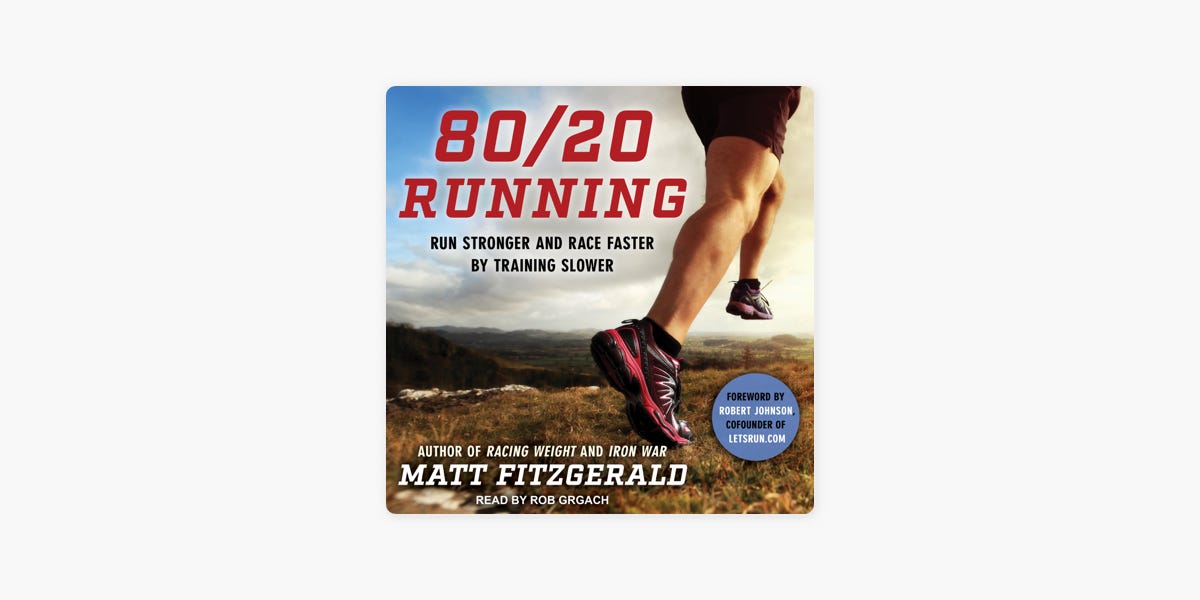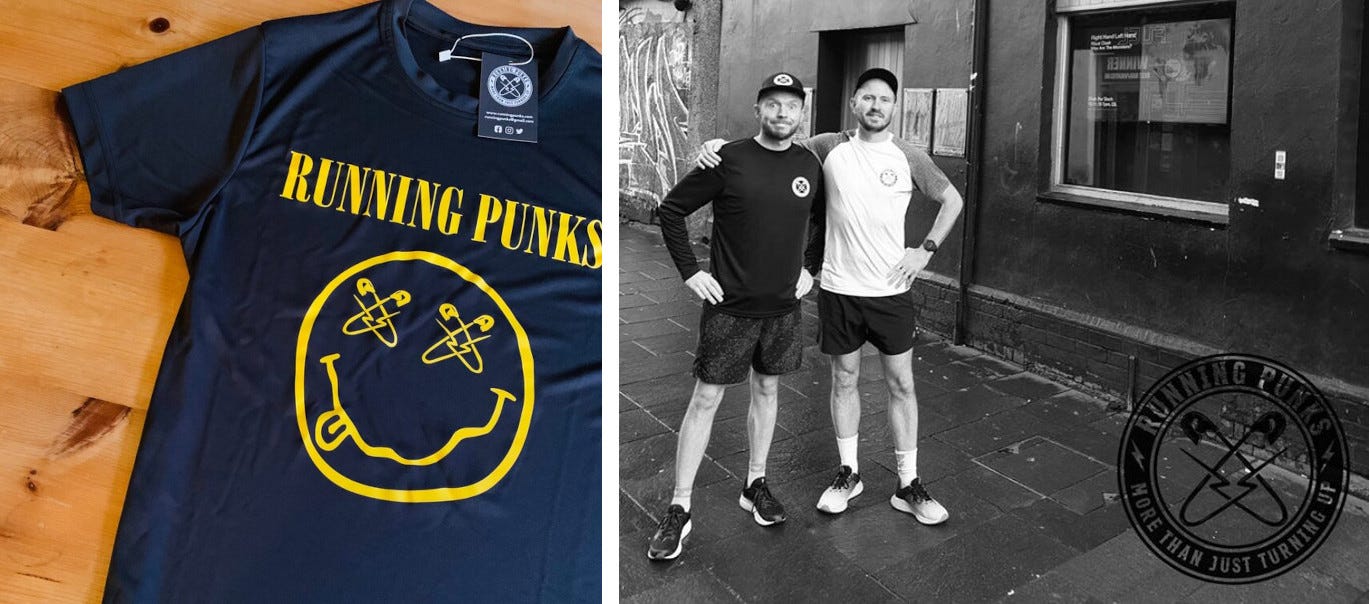Jimmy Watkins: The Running Punk
Falling back in love isn’t easy, but that’s what former Great Britain athlete Jimmy Watkins did with running. How? Creativity, community, and not measuring everything.
Welcome to Running Sucks, a running blog where I talk to interesting people in the running world to find out how to make running suck less.
“Punk was an attitude. It was never about having a Mohican haircut or wearing a ripped t-shirt. It was all about destruction, and the creative potential within that.”
Malcolm McLaren
For the first few years of the new millennium, James Watkins was a full-time athlete. Running 800m and 1500m track races for Great Britain. Getting Welsh indoor records here and major tournament appearances there. But then, in 2007, he gave it all up and followed a different passion of playing guitar. Again, he was a success, touring the world with celebrated indie punks Future of the Left.

Now? He’s combining those two huge parts of his life. You might remember Jimmy from the internet, when the videos of his unique running album reviews went very, very viral in 2020.
Jimmy, tell me why you started reviewing albums while running.
“Well, I started running again in 2019, and it totally changed my health. I stopped drinking because of it, and I just felt like a different person. When lockdown happened, I was really scared that this thing that I'd neglected for so long, which had suddenly come along and saved my life, might be taken away.”
During one of the 60-minute periods in which the UK government allowed Brits to exercise, Jimmy realized that he needed something more to take his mind off the pandemic-induced doom and gloom.
“Originally, I was just going to run and listen to albums I’d never heard before as a way to escape. Then I thought I should document it because all this… it had never happened before in the world. Just make a video to look back on. I remember thinking, ‘I'll watch how other people have run and reviewed music,’ right?”
The lightbulb moment came swiftly when he couldn’t find any other album reviews done by people while running online. He knew he could be the first to do this. And so it was.
One big unanswered question remains from that intro, though.
Why did you stop running in the first place, Jimmy?
“At the time, I stopped because I was like, “Fuck it. I don't like it.” That's it! As I got older, I thought there must have been more to it. The year before, I got to the final of the World Championships. You don't, at 25, quit something that you're so good at. What was going on in my head at that time?”
“I was always out at races on my own, and I'm not a guy who really copes well with being alone. I'd rather be in my room, reading a book than going out for a jog or socializing. The sport also got really serious all of a sudden - and rightly so. I had to make a note of everything I was eating, I was sleeping in an altitude tent, I had to do bloods once a week.”
“I thought, ‘This is not why I started running,’ so those things all built up.”
Build up they did, and it started to affect Jimmy performances. He was falling a few seconds short of predictions in the 800m races he was competing in. He had the talent and ability, but something was stopping him from doing it on the track.
“I remember warming up for a race in Holland on a little forestry trail next to the track, and it smelled exactly like the mountain by the house where I was a kid. Like… exactly the same. Right then, I didn't want to go back on the track. So I just stopped doing it.”
Over the following decade-plus, he spent time in bands and he spent time getting less healthy, but he also kept reading those books. That meant that when he did come back to the sport he loved the most, he approached it with a different outlook.
“Running is so much more than just exercising. When I was a professional athlete, running was a way to measure your success. Then running was a way to see how far I'd fallen [laughs]. It was like the ultimate test to see how much I sucked compared to how I used to be.”
“The understanding of what type of running is good for people has changed a lot in the last 10 years. You’ve got things like 80/20 running, where slow running is encouraged, for instance.”
“All that helped me tap into this new way of running, where running can actually make you more creative. It can actually relax you and help you work out difficult decisions. It can help you deal with addictions. None of that existed before. You just ran to get faster.”
The idea behind 80/20 running is that you spend 80% of your aerobic training (time or distance - up to you) at a low intensity (where you can talk comfortably) and the remaining 20% at a moderate-to-high intensity.
You can hit this equation however you want it. Five 5k runs per week? Do 4 of them slow and 1 of them fast. One 5-mile run per week? Go slow and then ramp it up for the final mile. It’s all up to you, but the benefits are proven.
Something else that didn’t exist 10 years ago how it does today is running watches, apps, measuring devices, and all the metrics and measurable statistics that go with them. After the first few years of expansion and acceptance into the running community via Garmin watches, the Nike Running app and Strava, and then into wider society through things like the Apple watch, there’s been something of a backlash more recently.
Whether it’s a bid to revert to the mean, or an overcorrection, there’s a desire in some quarters to move away from technology and the constant poring over data and back to just enjoying running organically. Jimmy was halfway there in 2007.
“I have a joke with some Running Punks who are ditching the watch. I say measurement is important. Say you've put on a birthday party and 12 people come, you're going to kick off if the shop can’t tell you how many people the cake can serve. Just think of running in terms of that. I know if I run more than 70km a week, I start getting injured, so I'll have a day off.”
“It’s funny because science was the thing I hated about running as a pro athlete, but now I rely on it so much.”
If you find yourself reading these interviews and thinking that the interview subject is miles ahead of you, consider that even Jimmy, a former pro athlete and current raconteur couldn’t get his head around the idea of a running club for music fans. That’s the concept floated to him in a “massive email” from his school friend, Rhodri Morgan
“Rhodri wanted to create a running community that would get musicians and music lovers running, right? I was like, ‘That’s amazing, but I've never heard of a running community. What the fuck is a running community??’”
Not sold on the idea, Jimmy just wanted the Running Punks to be him and his friend when they ran races, but then a few people bought the t-shirts, and a few more started tagging their runs with the #runningpunks hashtag. It was when Jimmy’s running reviews went wild online that the Running Punks really gained traction and became a fully-fledged run club in Cardiff, Wales.
“I saw that the running community was a real thing, because it's the same as a music community - it's just people who are fans of something coming together.”
“Without it, I 100% would have stopped running by now. I would have started drinking again by now. I just feel like I've become part of it. I definitely don't feel like it’s something me and Rhodri came up with.”
“There’s this really interesting quote where Jack White says he sees ‘Seven Nation Army’ more like a folk song - it’s not his song any more. That's how I feel about Running Punks. I see people do it and I just think it’s another person like me. It's a giant amoeba of runners and they just gobbled me up.”
You spoke about running making you more creative. What’s your personal experience with that?
“The running reviews take a lot of time now. At the start I used to wing them, but now I know the album I'm gonna do in advance. I listen to it on a run first, I write all my ideas down, then I keep listening until I find this thread, which connects me to the artist, and I just go.”
“Since I started doing that, there's been a few reviews where I've had the artist contact me, asking if I know someone who worked on this album because I've said something that only a person working on this album would know.”
“One artist is convinced that running and listening to music makes me psychic.”
“I've run on trails that I've fallen over on when I'm walking. When I'm running, I trust my instinct. I think you can do that with ideas when you’re running. That's definitely the most creative thing.”
“200 reviews in, though, and I still can't write my own songs very well.”
He may have gone through the destruction of his career as a top pro athlete and - to a certain extent - himself, but Jimmy Watkins has realized his punk rock creative potential time and time again, culminating in the current, best (again) version of himself. And I have no doubt there is more to come.
You can find a dozen brilliant running tips above, but this week’s top coaching tip is brief and it comes directly from Jimmy Watkins:
Take that first step!
“One thing I always tell myself is that you've only got to do that first step once. It's a little mind trick that works for me. Say I’m running a 10k. As soon as I take the first step, it’s no longer a 10k.”
Ways of making Running Suck less discussed today:
Run slowly
Enjoy yourself
Use running to relax
Make running fun again
Don’t take it too seriously
Fuel your creativity by running
Run with your friend from school
Take that first step out of the door
Find a group of strangers to run with
Use your stats to inform your recovery
Free your mind and think while running
Listen to a new album while you’re running
Read about running (you’ve just done that!)
Go follow Jimmy on Instagram and follow the Running Punks, too. Their smiles will put a smile on your face and make your day suck less!
Leave a comment below if you’ve experienced anything that Jimmy’s gone through, or if you’ve been using any of the tips from previous posts in your running routine. We’re all here to share and learn!






Love this one!